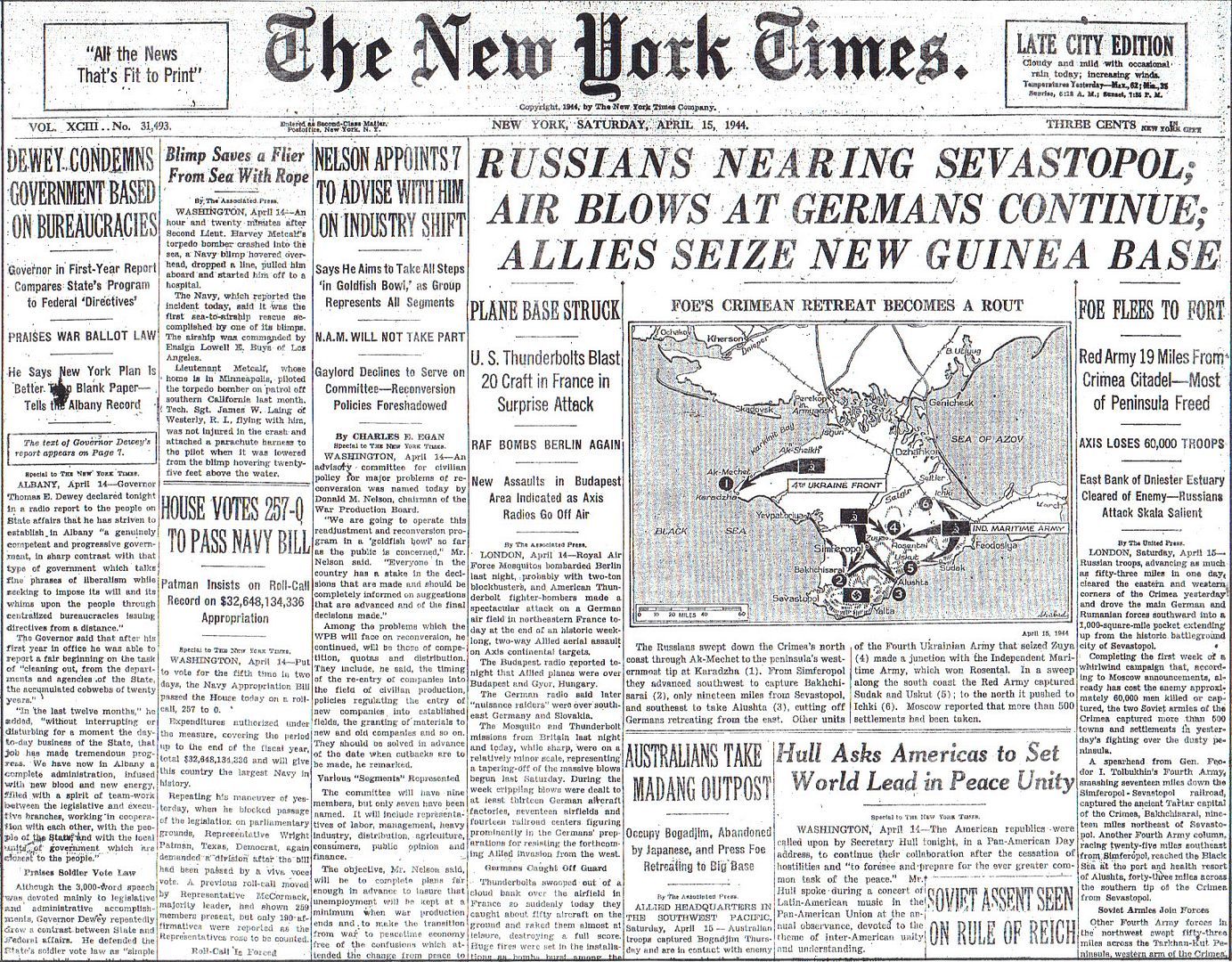
Posted on 04/15/2014 4:59:55 AM PDT by Homer_J_Simpson

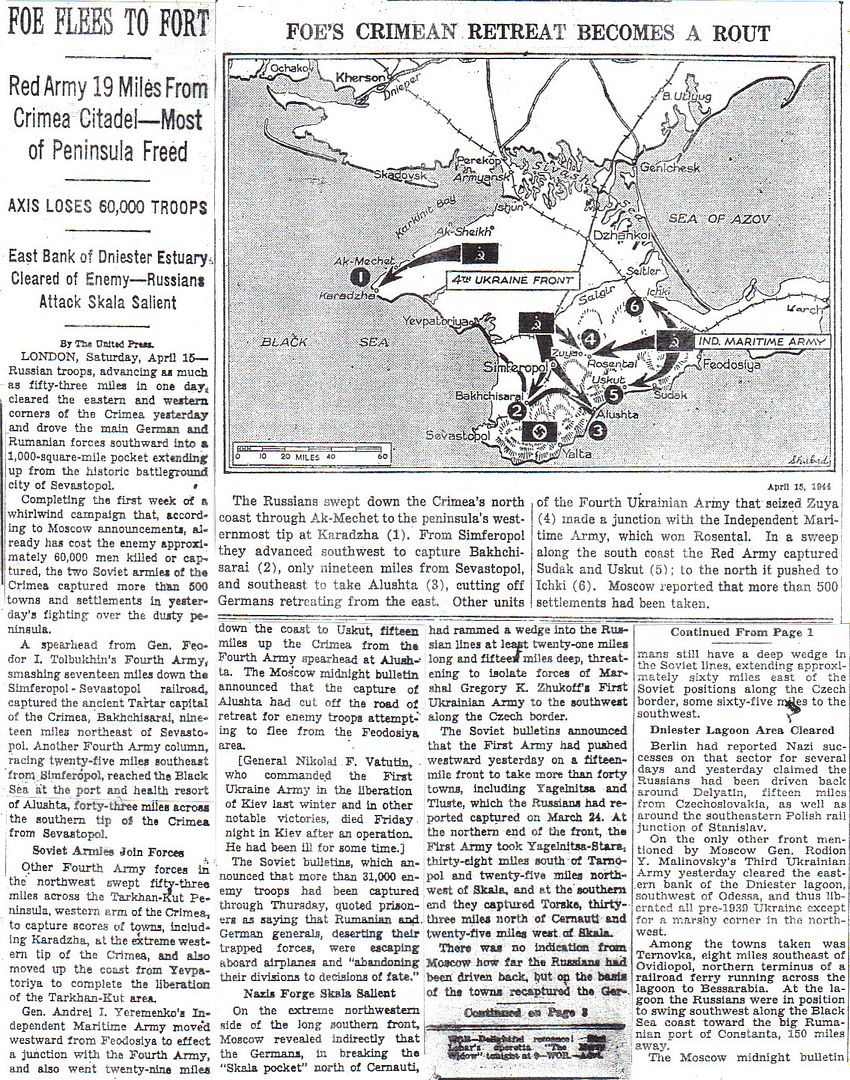
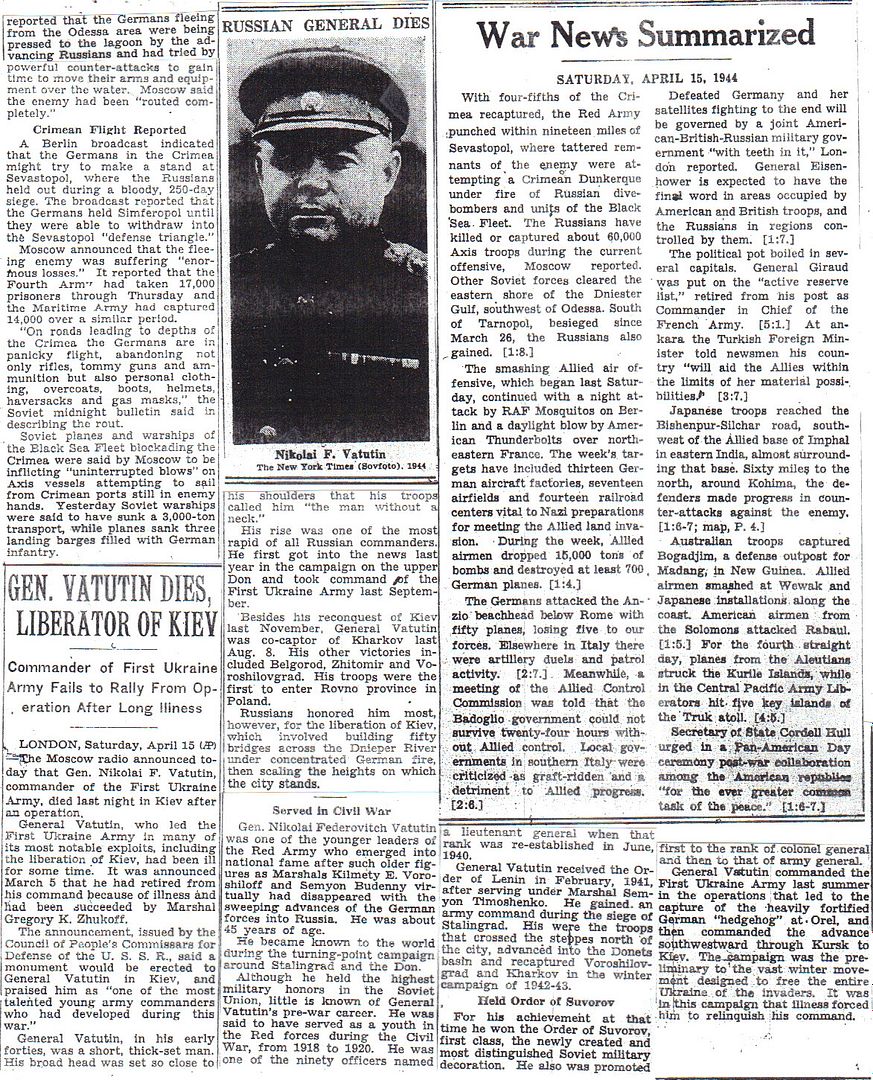
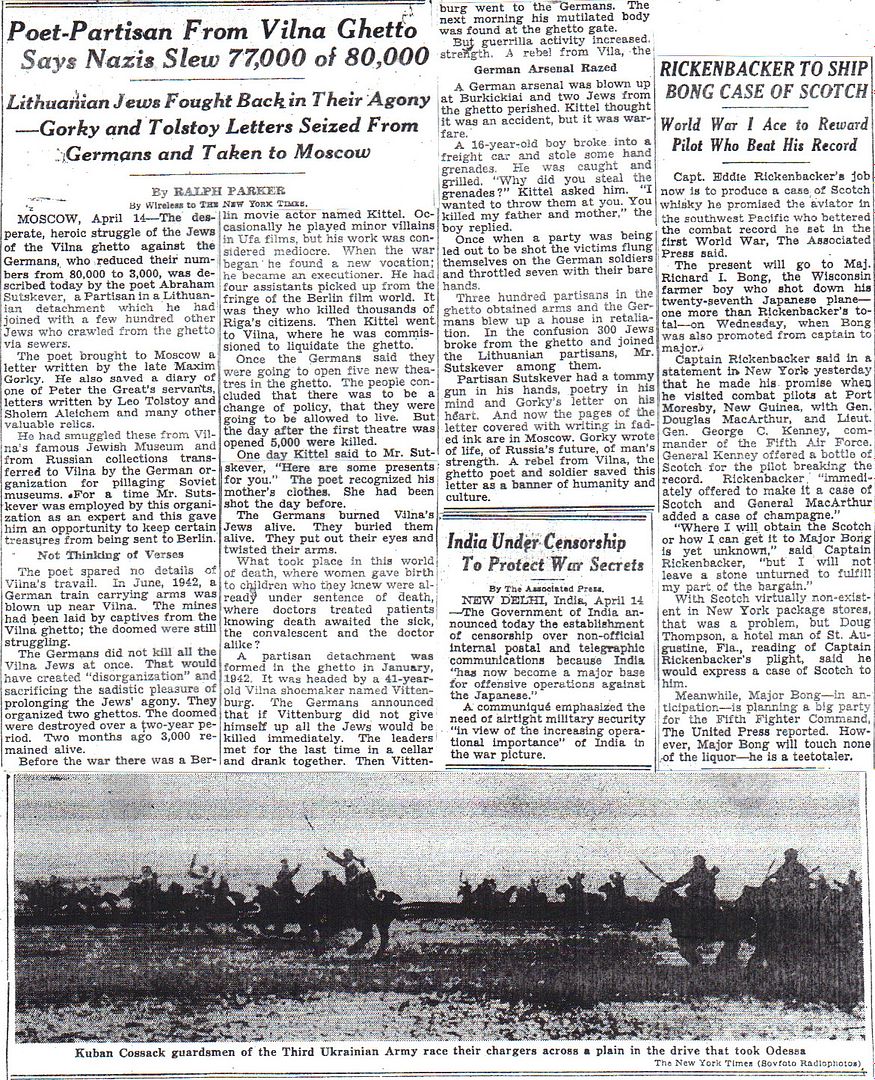
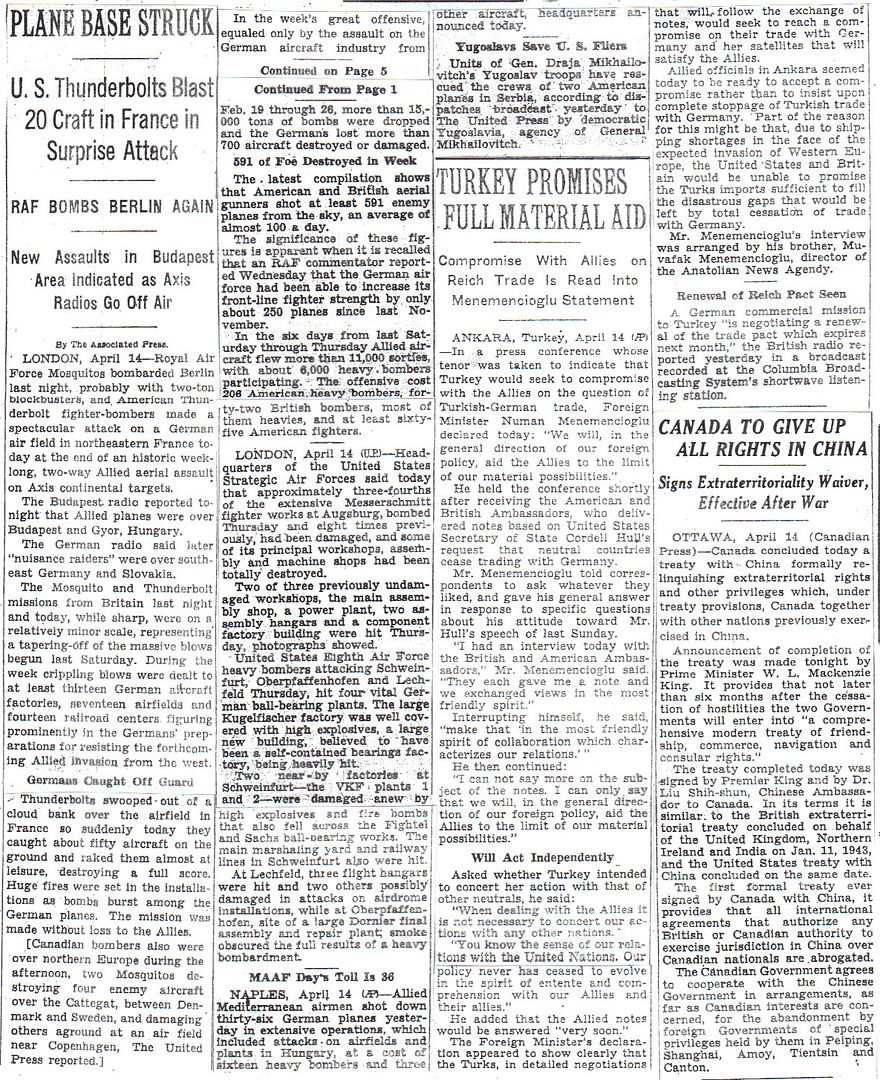
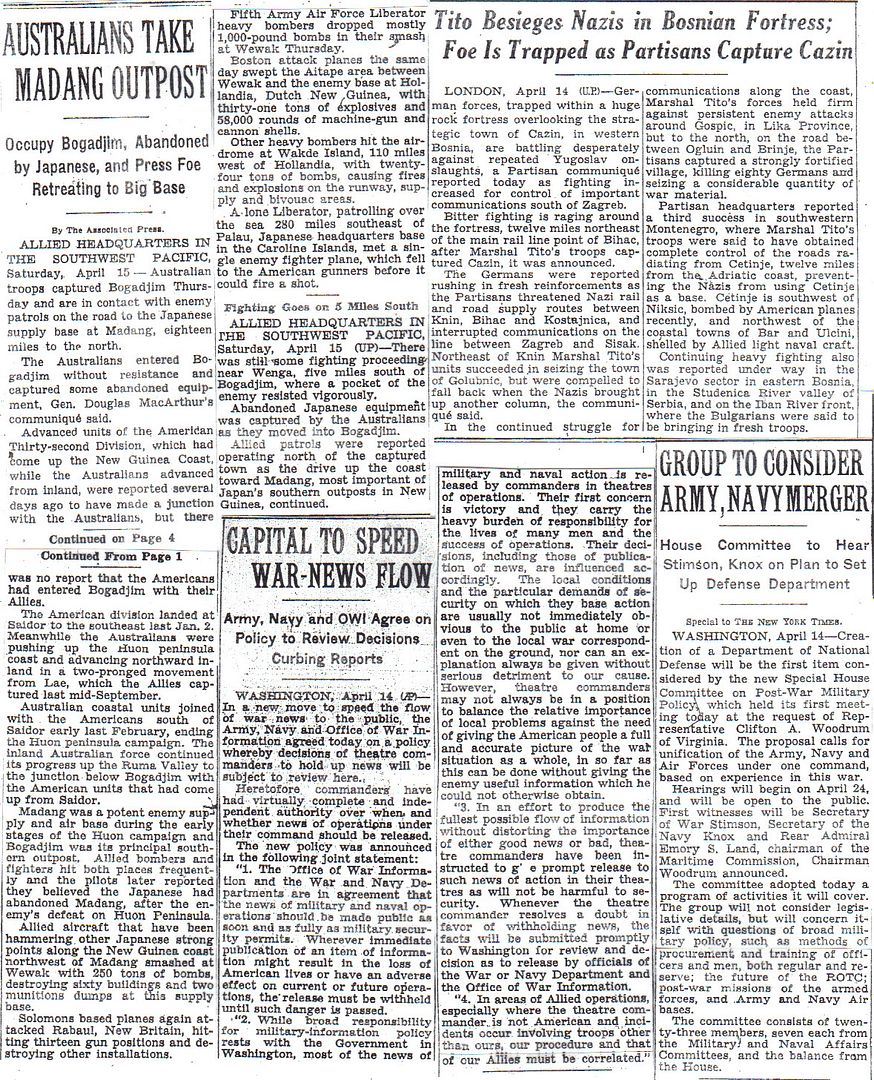
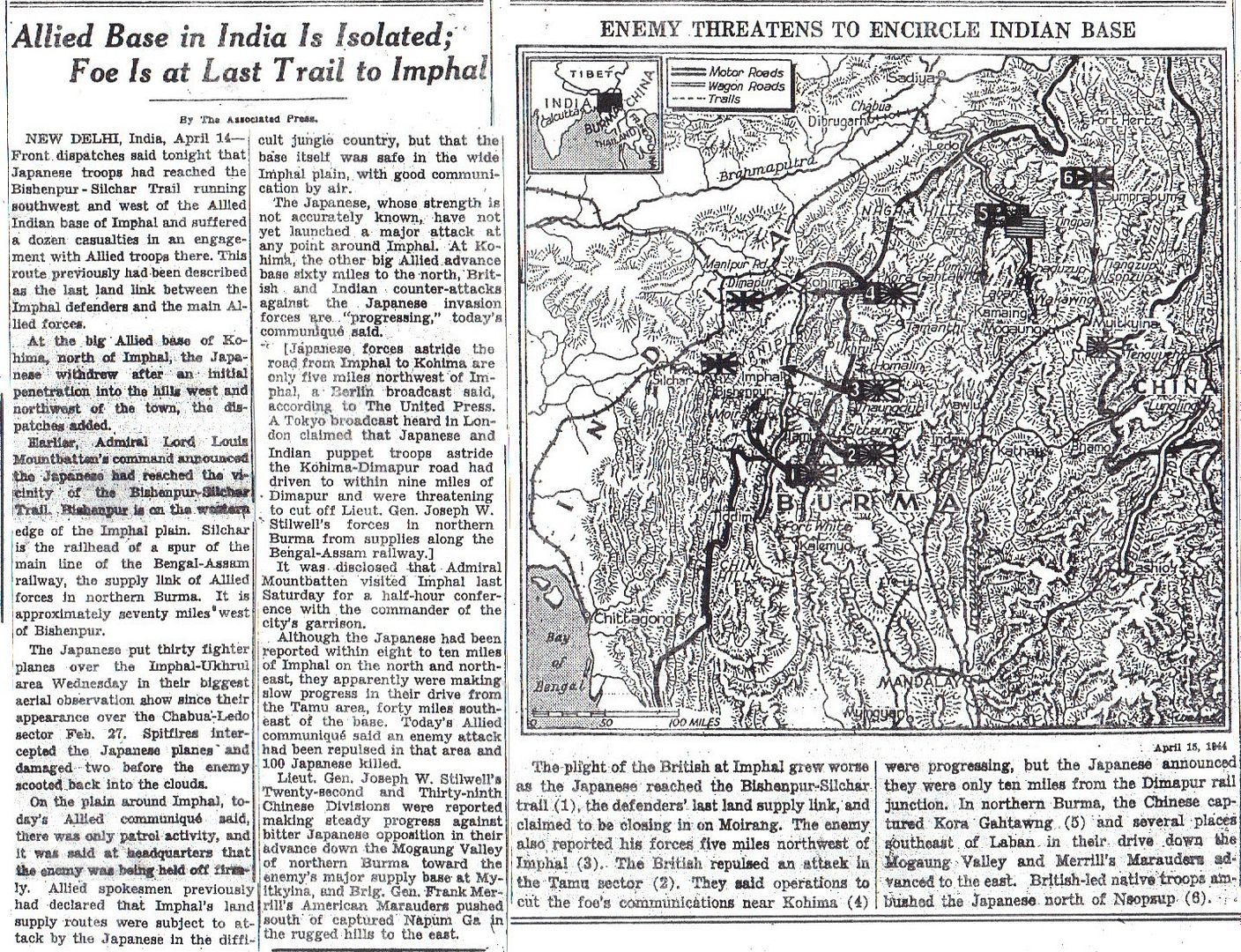
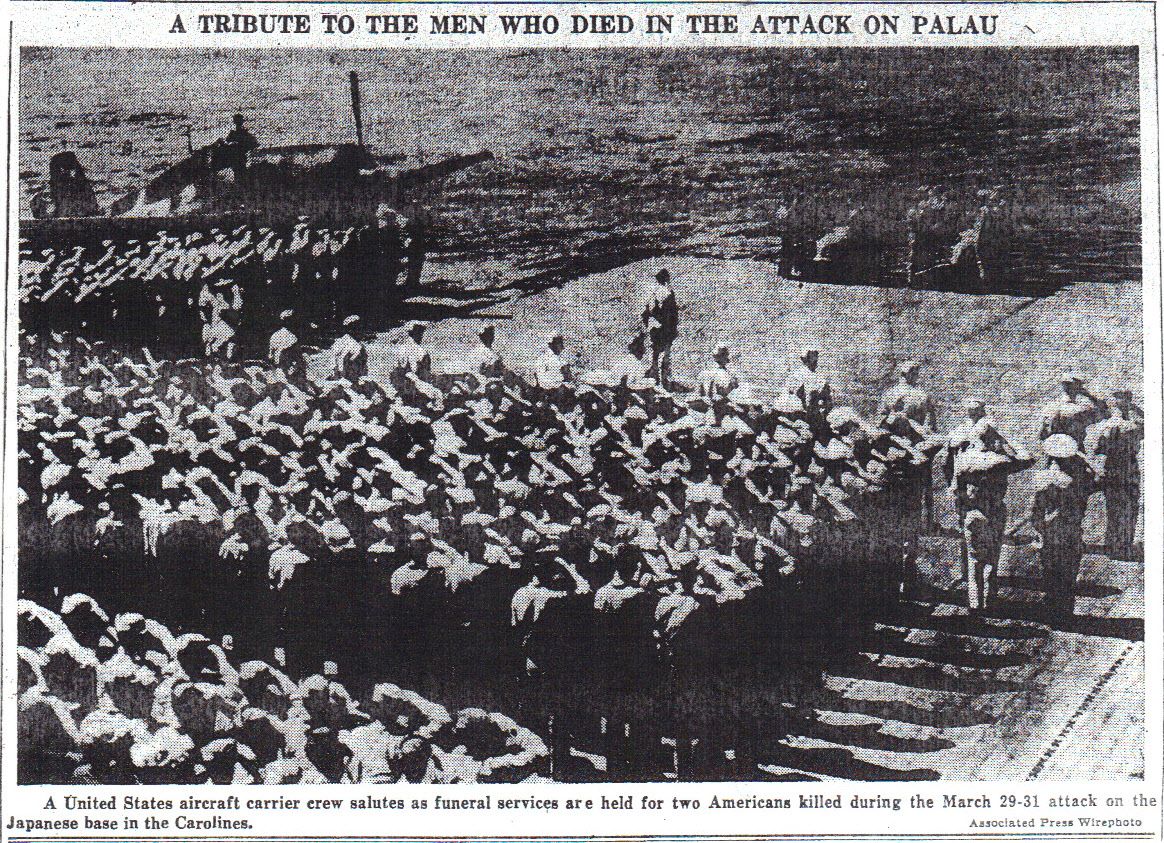
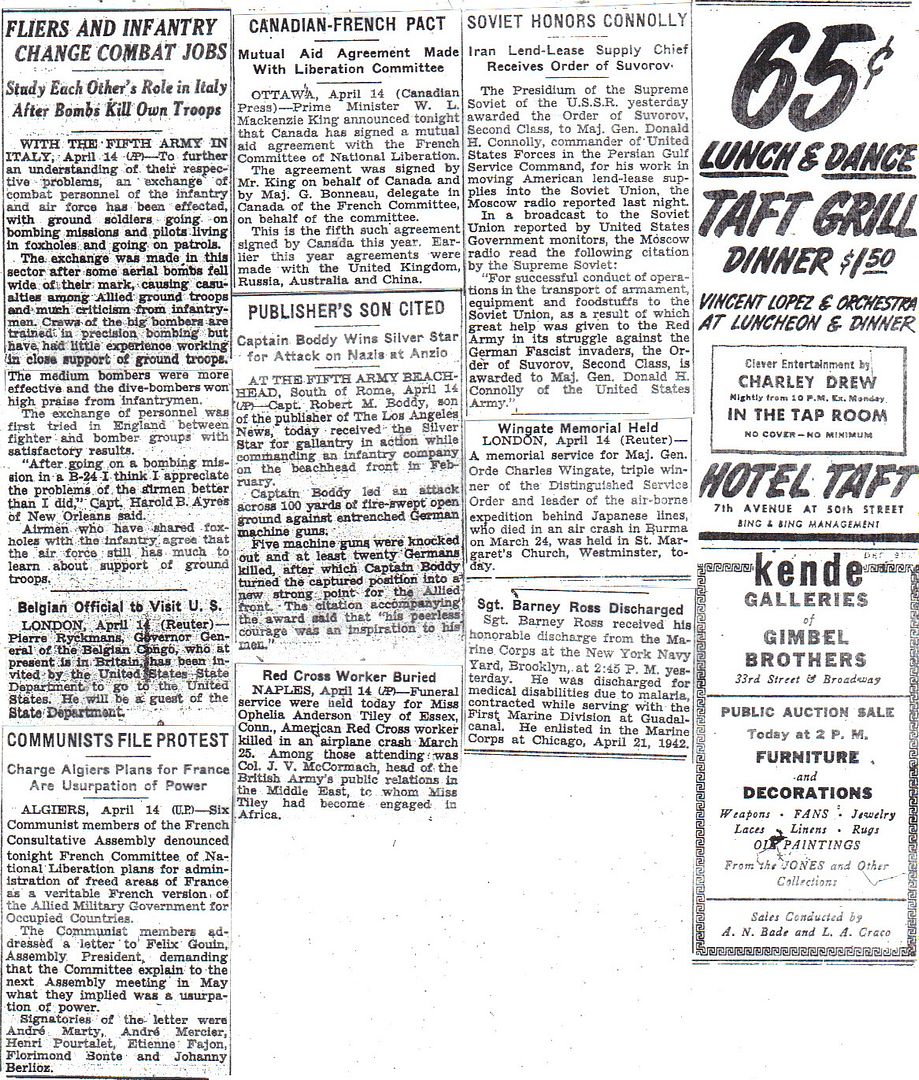
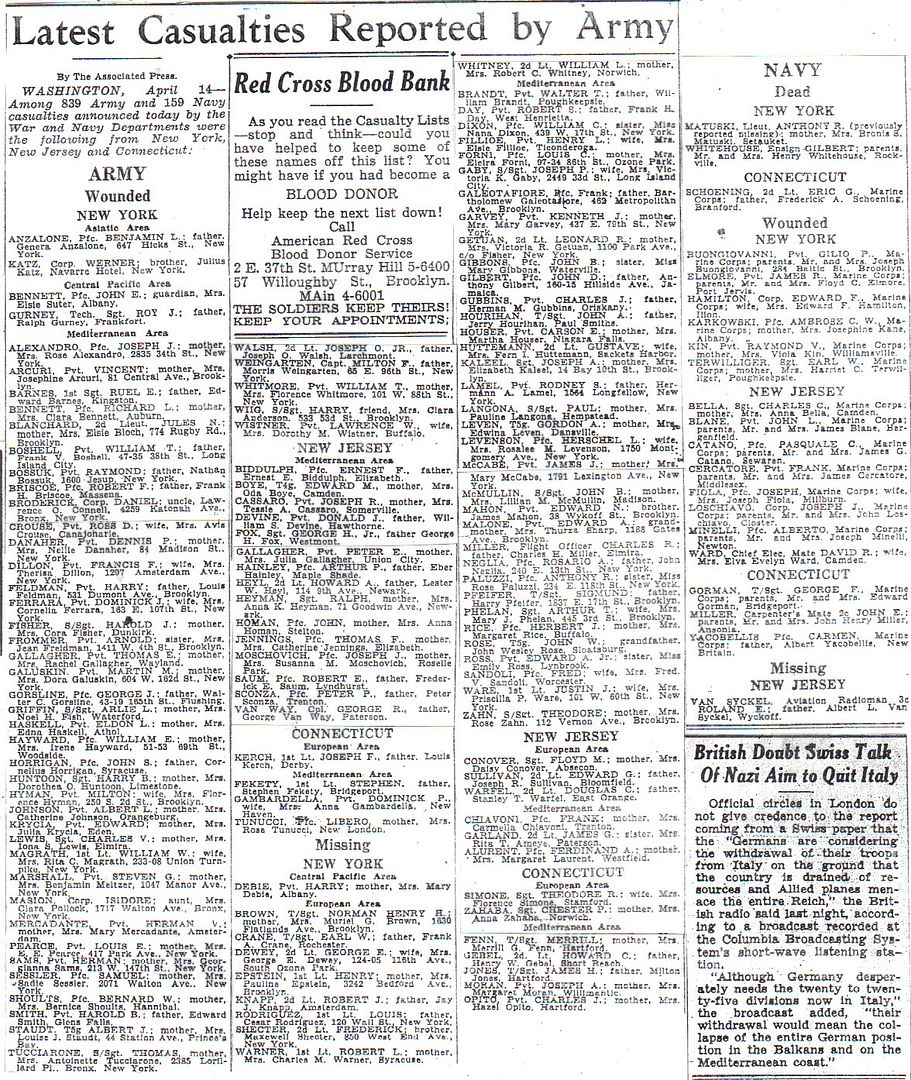
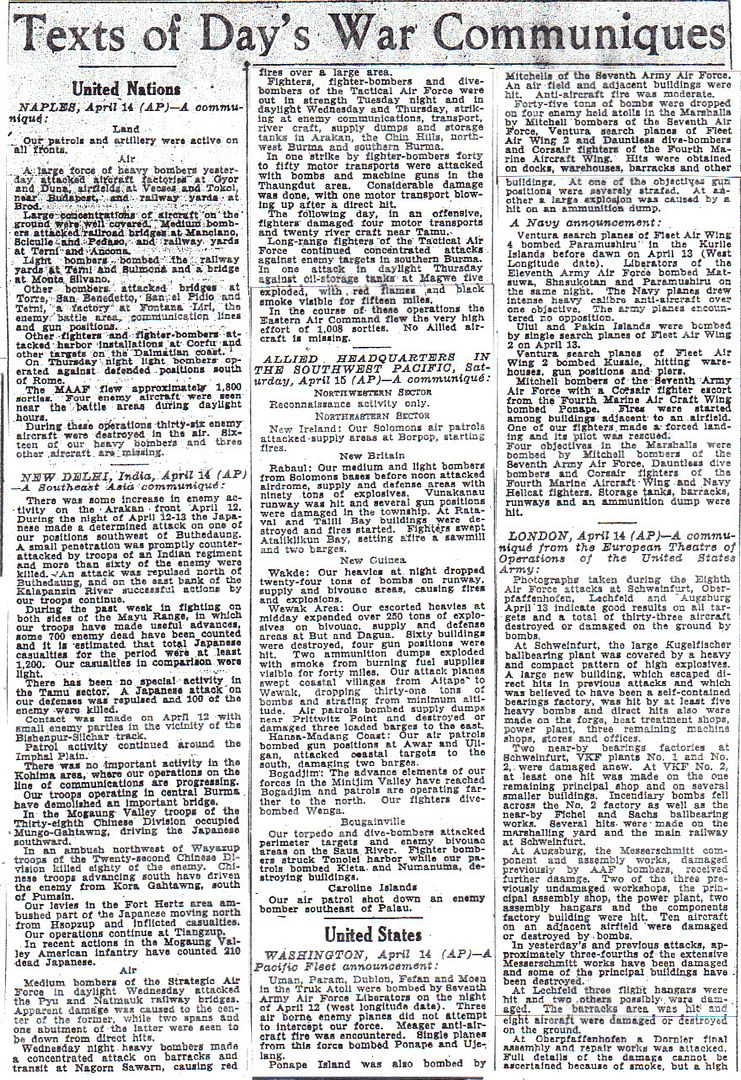
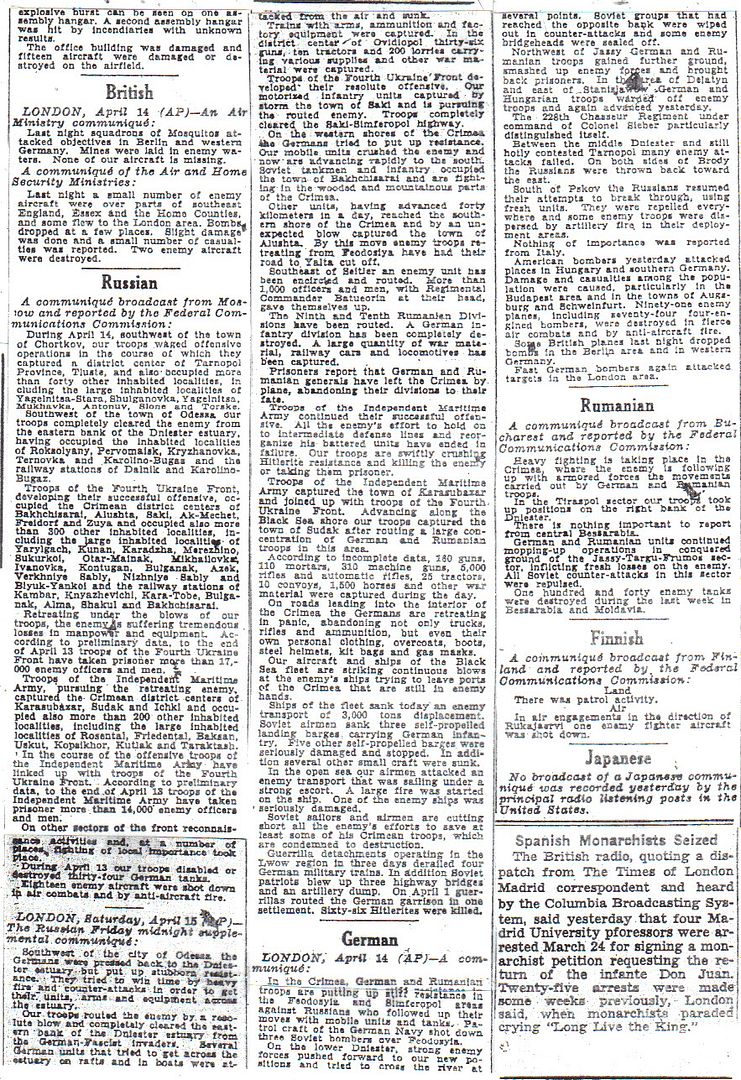
And the next day:
Prime Minister to Mr. Leeper 15 Apr 44
Do not be influenced by possible anti-British sentiment among the local Greeks. It would be a great mistake to end this grave business up in a pleasant kiss all round. That might come later as an act of clemency from the King and his new Government. We have got to get these men into our hands disarmed, without conditions, and I trust without bloodshed.
Winston S. Churchill, Closing the Ring
#1 - “Besame Mucho” – Jimmy Dorsey, with Bob Eberly and Kitty Kallen
#2 - “Holiday for Strings” – David Rose
#3 - “It’s Love Love Love” - Guy Lombardo, with the Skip Nelson Trio
#4 - “When They Ask about You” - Jimmy Dorsey, with Kitty Kallen
#5 - “Mairzy Doats” – Merry Macs
#6 – “San Fernando Valley” - Bing Crosby
#7 – “I Couldn’t Sleep a Wink Last Night” – Frank Sinatra
#8 - “Poinciana” – Bing Crosby
#9 – “Shoo Shoo Baby” - Andrews Sisters
#10 – “Do Nothin’ Till You Hear from Me” – Woody Herman
http://www.onwar.com/chrono/1944/apr44/15apr44.htm#
Soviets capture Tarnopol
Saturday, April 15, 1944 www.onwar.com
On the Eastern Front... Soviet forces of the 1st Ukrainian Front capture Tarnopol after several weeks of fighting. The German commander, General von Neindorff, is killed in the fighting and only a part of the garrison escapes to reach the German lines.
Over Romania... The US 15th Air Force sends 500 sorties to Bucharest and Ploesti.
http://www.etherit.co.uk/month/thismonth/15.htm
April 15th, 1944 (SATURDAY)
UNITED KINGDOM: London: The US Eighth Army Air Force and RAF Bomber Command have switched their attention from the cities and factories of Germany to the railways of France and Belgium to prepare for the Allied invasion.
It is not a move which pleases the commanders of the bomber forces. Sir Arthur “Bomber” Harris of the RAF still believes that he can bring Germany to its knees by area bombing: despite the terrible casualties inflicted on his aircrews during the Battle of Berlin. Remembering the slaughter in the trenches of the First World War, he has no confidence in the invasion. But it is his men who are being slaughtered in this war. Lt-Gen Carl “Tooey” Spaatz, who commands the US Strategic Air Forces in Europe agrees with Harris, but for different reasons. Spaatz believes that he can destroy the Germans ability to fight by destroying their oil plants. He also fears that supporting the army will compromise the air force’s hard-won independence.
Their resistance forced General Eisenhower to go to his political bosses for a decision. He argued that if the “Transportation Plan” bombing campaign was not carried out, the invasion would fail. He won, and has assumed command of both British and US bombers for the period of the invasion.
FRANCE: Countdown to D-Day:
The German Perspective
Sunday, 15 April, 1944
It is late in the evening of April 15th. A modest rain falls over the château of La Roche-Guyon. Cold sentries shiver miserably as they stand at their posts. Their soaked, camouflaged capes are wrapped tightly around them as they miserably watch the rain come down. Anti-aircraft crews thankfully have received permission to stand down.
A lone army car enters the wrought-iron gates and pulls
up to the château. The right rear door opens, and a single, unknown figure slowly emerges. As he stands up, raindrops began to softly strike his immaculate coat and hat. The sentries see that he is an army general.
Staff members come out to welcome him, get his bags, and escort him inside. He is told that the field marshal is in, having just returned from a number of inspections along the coast. The newcomer’s arrival is announced, and he is shown the way to Rommel’s study. Calmly, he reports in.
The field marshal stands up and greets him with a tired smile, then looks at the man. He is of medium height, squarish build — not really overweight. He wears thin-framed spectacles on a lightly-freckled, owlish face. He is 46-years old, and his new rank is that of -General der Infanterie-.His name is Hans Speidel. He is Rommel’s new Chief of Staff.
But this man is an old acquaintance as well — a fellow Swabian. While he is not an aristocrat, he is by all means a stately, well-educated man. Fluid in several languages, he held a doctorate degree from Tübengen University. He is cultured in the finer arts and advanced contemporary literary works. That’s why Rommel had picked him as his next -Chef-.Rommel asks him about his trip, and then as an opening gambit, mentions that here they are again, back in France. Speidel is certainly no stranger to the country. He has fought here in both world wars, has once been the German military attaché in Paris, and was once Chief of Staff to the Military Governor of France. But when in 1942 the SS had taken over the judicial side of the military government, he had transferred to the Eastern Front. Now he s back.
As the two men relax with each other’s presence, the dialogue speeds up. At a certain point, the conversation shifts gears from high German to Swabian, the southern German dialect that they had both been raised with.
Speidel tells him about the briefing at OKW, and that there are no specific instructions. “I am to assume the duties of Chief of Staff for you.”
Regarding policy? “I was told that none were needed. Basically, if the enemy lands, we must just drive them back into the sea.” That is it. Rommel is probably puzzled at this. It is as if the successful Allied landings at Salerno or Anzio. had never happened.
They briefly talk over old times. They had met in the Argonne Forest during World War I, and later, between wars, their paths had crossed in the 13th Württemberg Infantry Regiment. Rommel remembers him as a rather quiet but sophisticated and very intelligent fellow. Now he finds himself warming up to the man. Yes, they will get along quite well.
When Speidel had arrived at Berchtesgaden on April 1st as ordered, Jodl had informed of his new appointment and then had taken him aside and had pleaded for him to try and cheer the field marshal up. The appointee agreed to do so.
Contrary to what he had promised Jodl though, and more along the lines of the conspirators’ plans, Speidel does not try to give Rommel inspiration. On the contrary. He depresses him. He has to, if he is to have any hope at all of winning Rommel over to the “Schwartz Kapelle.’.
It is easy to do. Rommel is starved for news, and Speidel is willing to give it to him. He fills him in on the latest information about the Eastern Front, from which he had so recently come, including the latest updates from OKW. He tells him about the massive Soviet March offensive. About the 1st Panzer Army being trapped. The setbacks in the centre. Von Kluge and Manstein’s dismissal. About his own army, the Eighth, being trapped and having to desperately fight its way out.
Speidel paints the already-bleak picture darkly, flavouring it negatively. He cannot help but present Germany’s hopeless position in the war. He describes in detail about how the eastern armies are losing hundreds of thousands of men and countless numbers of vehicles in the freezing cold, as dozens of divisions get chewed up. The rumours of atrocities...
He relates briefly how the Crimea is now totally lost, and that the southern army front is in full retreat, while the weak Army Group Centre is moving back steadily. And of course, there is the next round coming up - the Russian summer offensive starts in a couple of months...
The effect upon the field marshal is immediate and considerable. Rommel shakes his head more and more as Speidel goes on. By the time his new chief of staff is finished, his good mood is gone.
Looking at him, Rommel shrugged his shoulders and says, “Well, I don’t think we have the slightest chance now of winning the war.”*
His diary entry for that day reflects his sour change in disposition, and how upset he is at Manstein’s dismissal. He admires the man.
“What will later historians have to say about these retreats? And what will history say in passing its verdict on me? If I am successful here, then everybody else will claim all the glory -just as they are already claiming the credit for the defences and the beach obstacles that I have erected. But if I fail here, then everybody will be after my blood.”
Speidel has done his work well.
Pete Margaritis
GERMANY: The Eighth Air Force flies Mission 303: 616 fighters are dispatched on strafing sweeps of central and western Germany, airfields being the primary objectives; 132 P-38s claim 7-0-2 Luftwaffe aircraft, 11 P-38s are lost; 262 P-47s claim 20-1-23 aircraft, 7 P-47s are lost; 222 Eighth and Ninth Air Force P-51s claim 30-0-10 aircraft, 15 P-51s are lost. (Jack McKillop)
FINLAND: Finland officially rejects the Soviet terms for peace, stating that they would be impossible to meet. This refers primarily to the Soviet demand for 600 million USD reparations, which the Finnish economic experts think impossible to pay in time without ruining the Finnish economy. As for the other Soviet demands, military experts think the Soviet demand of rapid demobilization together with the inevitable war against the Germans a dangerous combination. Majority of the people also still find it hard to accept the permanent loss of the territories lost after the Winter War, plus Petsamo, esp. as the Finnish lines of defence are still where the Finnish advance was stopped in 1941. Many are still confident that the German situation is not hopeless, although the highest Finnish leadership doesn’t share this hope.
From now on, the Finns see two possibilities. The first is that the Soviets think the Finnish front too unimportant to warrant a major transfer of troops from the most important effort against the Germans. In this case Finland could perhaps secure better terms later. The second is that the Soviets will attack, but that the attack could be repulsed, and after that Finland could have better terms. The latter is essentially what eventually happened, but whether the somewhat lighter terms received in September 1944 were worth the almost 20 000 deaths suffered in the battles of summer 1944 (not to mention the Russian losses), is another matter. (Mikko Härmeinen)
U.S.S.R.: The Red Army captures Tarnopol. One of the principal cities of Eastern Galicia, across the former Polish border. Tarnopol, traditionally a part of Poland, then part of the Soviet Union, had become German-occupied territory in the great German offensive eastward in June 1941. (Jack McKillop)
Vilna: 40 Jewish prisoners working as a “Blobel Commando” digging up and incinerating massacre victims buried at Ponar Woods escape; 25 are shot dead.
HUNGARY: With today’s round-up of Jews in the German-occupied areas of Ruthenia and Croatia, Hungary is no longer a safe refuge for Jewish people. The Hungarian government has hitherto stood up to German demands for the 767,000 Jews to be deported for “special treatment” in Poland. Miklos Kallay, who was premier until 22 March, refused to take any measures against the Jews, refusing German pressure to institute ghettoes and badges for them.
In April last year, Hitler reproached Hungary’s regent, Admiral Miklos Horthy, for his liberal attitude. Horthy said he could not “beat the Jews to death”; the Führer treated him to a lecture, saying that nations which did not rid themselves of Jews perished.
They met again last month. With the Red Army approaching the Hungarian border, Hitler was insistent. Horthy was to replace Kallay with Dome Sjotay, who boasted that he was a “true pioneer of anti-Semitism”. It was agreed that a German plenipotentiary, Edmund Veesenmayer, and a security police force under SS Maj-Gen Otto Winkelmann were to supervise Hungary’s internal affairs.
On 19 March German troops moved into Hungarian combat zones. At the same time Adolf Eichmann, the head of the Gestapo Jewish office, arrived in Budapest. His painstaking attention to detail has ensured the shipment of millions of European Jews to the extermination camps. He has brought a team of Einsatzkommandos with him to carry out the deportations with their customary brutality.
Meanwhile, at Auschwitz-Birkenau, the guards chuckle that “soon we’ll be eating Hungarian salami”. Engineers are checking and overhauling the gas chambers and crematoria. They are clearly expecting some big transports to arrive soon.
ROMANIA AND YUGOSLAVIA: Clearing weather again permits Fifteenth Air Force bomber operations. 448 B-17s and B-24s attack marshalling yards; B-17s hit Ploesti, Romania and Nis, Yugoslavia; B-24s hit Bucharest, Romania; 150+ fighters provide escort.
A special group, led by Lieutenant Colonel Louis A Neveleff, flies from Fifteenth Air Force HQ at Bari, Italy to Medeno Polji, Yugoslavia and from there the group proceeds to Marshall Tito’s HQ at Drvar, where Colonel Neveleff confers with Tito and spends several days laying the groundwork for the evacuation of downed US airmen in Yugoslav hands. Also, much information is gathered regarding the military organization and political trend of the partisan movement. The mission returns to Italy on 2 May and 122 men, mostly Fifteenth Air Force airmen, are also evacuated. (Jack McKillop)
ITALY: The French take San Giorgio as the German Gustav Line starts to crumble.
Foggia: A force of 448 B-17s and B-24s of the US 15th Air Force escorted by 150 Mustangs fought its way to the Ploesti oilfields and the Romanian capital, Bucharest, today against packs of German fighters to drop its bombs on railway targets.
The attacks were part of the Allied air assault on Nazi communications with the southern front and has brought US bombers within 140 miles of the Russian spearheads in eastern Romania.
The Germans adopted new tactics by sending rock-firing Do-217 nightfighters against the Liberators attacking Bucharest. The Luftwaffe lost 13 aircraft in the day’s battles, while the Americans lost ten bombers and four fighters.
The raids were followed tonight by RAF Wellingtons which carried 4,000-pound bombs in their first raids on Romania. Their target was Turnu Severin, a railway town on the north bank of the Danube, on the main line to Bucharest from Budapest and Belgrade.
The crews of the last wave of Wellingtons said that they could see the glow from fires 60 miles away. They went in low, machine-gunning flak barges on the Danube and shooting up an airfield before dropping their bombs on the railway yards.
Twelfth Air Force B-25s and B-26s strike a marshalling yard at Leghorn and a tunnel and railroad bridges in central Italy; P-47 Thunderbolts attack rail lines, bridges and ammunition dumps northeast of Rome with good results; other P-47s, P-40s and A-36 Apaches hit numerous targets, including rail lines, motor transport shop, vehicles, tanks and gun positions, in central Italy and in the US Fifth Army battle areas. (Jack McKillop)
INDIA: 12 Tenth Air Force B-24s over the Andaman Islands attack shipping and other targets at Port Blair. (Jack McKillop)
BURMA: 12 Tenth Air Force P-38s hit Heho Airfield destroying several parked airplanes. (Jack McKillop)
FRENCH INDOCHINA: 3 Fourteenth Air Force B-25s knock out a bridge at Viet Tri and damage another. (Jack McKillop)
JAPAN: During the night of 14/15 April, 3 Eleventh Air Force B-24s on armed reconnaissance mission over Matsuwa and Onnekotan Islands in the Kurile Islands, hit several targets including Matsuwa Airfield; reconnaissance over Paramushiru Island fails due to overcast. (Jack McKillop)
BISMARCK ARCHIPELAGO: On New Britain Island, 24 Thirteenth Air Force B-25s bomb an ammunition dump on Talili Bay; 11 P-39Airacobras follow with a strike on the same target; 3 P-38s fire the Wunapope supply area; other fighter-bomber strikes on the same area are cancelled by weather. (Jack McKillop)
MARSHALL ISLANDS: Seventh Air Force B-25s, based on Tarawa Atoll, bomb Maloelap Atoll, rearm at Majuro Atoll and hit Jaluit and Mille Atolls on the return trip. (Jack McKillop)
NEW GUINEA: 180+ Fifth Air Force B-24s, B-25s and A-20 Havocs bomb landing strips, off-shore islands and the entire coastal area in the vicinity of Aitape; 16 P-40s strafe barges at nearby Seleo Island; 20 P-39s hit villages, supply dumps, trucks and other targets along Hansa Bay and in the Alexishafen area. (Jack McKillop)
SOLOMON ISLANDS: A few Thirteenth Air Force P-38s hit targets in the northeastern part of Bougainville Island. (Jack McKillop)
PACIFIC OCEAN: Two Japanese ships are sunk at sea:
- A merchant cargo ship is sunk, probably by a mine laid by submarine USS Steelhead (SS-280), off Honshu, Japan.
- British submarine HMS Storm sinks a minesweeper in the Andaman Islands. (Jack McKillop)
"On March 19, 1944, the Nazis occupied Hungary and began to draw up plans for the annihilation of that country's 725,000 Jews, who had been largely unmolested until then.
Most of these Jews were deported to Auschwitz, the largest of the death camps.
This map shows the police districts into which the Nazis divided Hungary for the purpose of efficiently transporting the nation's Jews."
"The process of ghettoization and deportation proceeded remarkably quickly in Hungary, and Jews were usually shipped out just a few days after being forced into ghettos.
This photograph shows Moritz Goldstein and his son Endre in the ghetto in Debrecen.
Moritz and his wife, Matilde, had four sons, only one of whom, Ernst, survived the war.
He immigrated to the United States in 1946."
Let me put it this way: Crimea and Ukraine are not usually the subjects of world news headlines.
Indeed, we might guess it could be another 70 years before we see them here again...
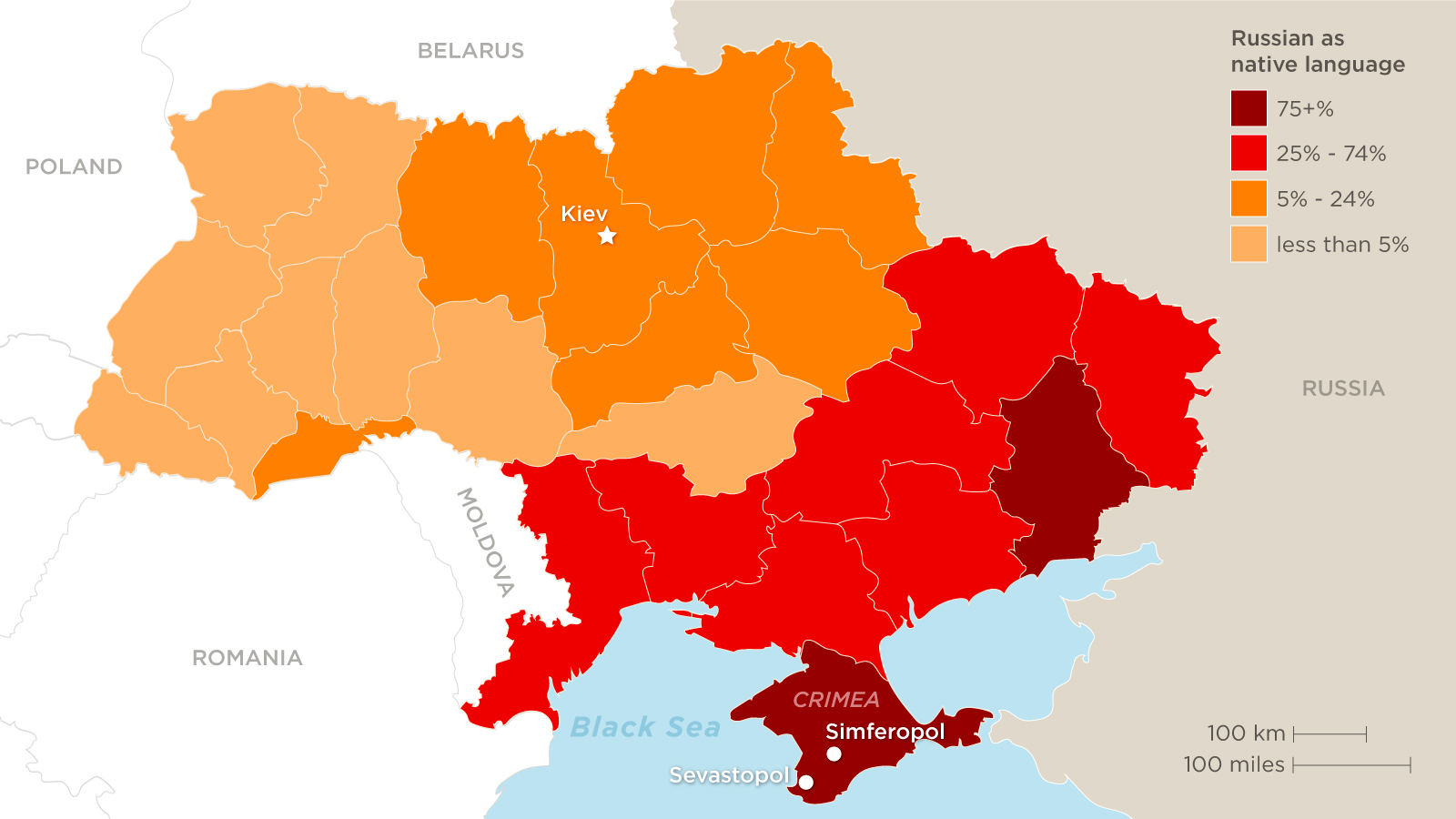
Deja vu all over again!
x 10. That's some trodden ground.
These past few days I cant help but notice how quiet the reporting on the Italian front has become. I presume it’s due to the continued stalemate at Cassino?
Is that color-coded map of Ukraine suppose to show the percentage of ‘ethnic’ Russians?
Wish there was a legend to that map.
Due to lack of movement at Cassino and Anzio the coverage is lighter in April and May. Some days it is off page 1 altogether. On the other hand, the casualty lists for the Mediterranean theater just get longer.
I have to keep reminding myself that this isn’t actually happening today.
Scary times.
The Soviets have announced that General Vatutin died after a long illness. Lead poisoning, actually.
In all seriousness, his loss was a blow to the Red Army leadership. He had developed into the most audacious and daring Red Army commander. His handling of 1st Ukrainian Front from November 1943 to March 1944 was masterful. That formation, usually consisting of 5-7 field armies and two tank armies, was the largest combat formation in the Red Army and contained most of its crack units. Vatutin was able to direct a series of complex operations on several different axes.
Had he not perished, it’s likely he would have been the conqueror of Berlin.
I did note an error in his biographical obituary; he was not the commander of forces that expelled the Germans from the Orel salient; that honor went to Rokossovsky. He was the commander of the Soviet forces that took the brunt of von Manstein’s main effort at Kursk, and then led the counterstrokes in late July and August.
One other item missing from his biography is that he also led the Soviet forces on their over-extended gallop toward the Dnieper River in February, 1943. His bullheaded rush into the steppes well past his logisitical limits was countered by von Manstein’s “Miracle of the Donetz” which destroyed most of Vatutin’s forces and restored the German front. But one can understand why the Soviets are reluctant to remember that.
The story about the slaughter of the Vilna Jews is sickening. Readers of the Times can’t say they didn’t know.
The Germans knew.
The Germans adopted new tactics by sending rock-firing Do-217 nightfighters against the Liberators attacking Bucharest.
Hmm? And the Germans wonder why they lost the war/
Disclaimer: Opinions posted on Free Republic are those of the individual posters and do not necessarily represent the opinion of Free Republic or its management. All materials posted herein are protected by copyright law and the exemption for fair use of copyrighted works.